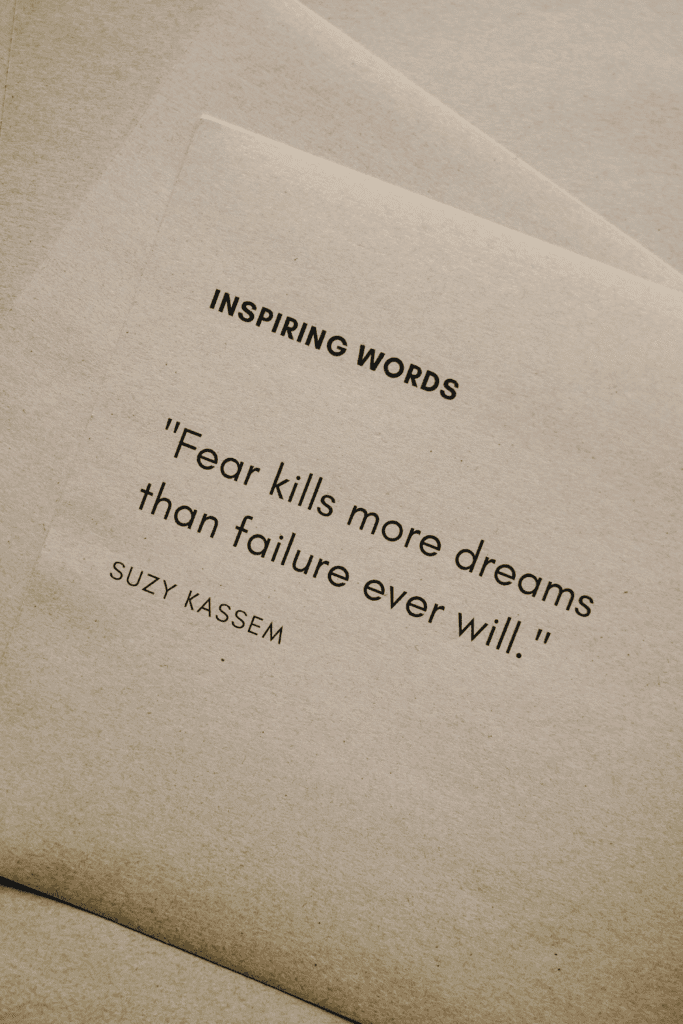How I Overcame the Fear of Starting Something New (Unrelated to My Career)
I still remember the moment I seriously considered starting something completely outside of my SAP consulting career.
My heart wasn’t racing with excitement—it was frozen with fear of starting something new. What if I failed? What if I looked foolish? What if I wasn’t “meant” for this?
For years, I lived in airports and conference rooms, building systems for other people’s businesses. I was good at it. Safe in it. But somewhere along the way, I started asking myself questions that wouldn’t go away: “What am I building? For whom? For what?”
If you’ve ever felt like starting something new after burnout means throwing away your past… I see you. That was me.
What the Fear Actually Felt Like

The fear of starting over in a new career—or, in my case, starting something alongside my career—felt like standing at the edge of a cliff in the dark. I couldn’t see where I’d land, and every voice in my head was listing reasons to step back.
Afraid to start something new in life? Yeah, that was my daily reality.
The fear had many faces.
Fear of judgment. Who was I to think about teaching online income strategies? I was just a consultant who happened to figure out some things about remote work and freedom. The voice in my head kept saying, “You’re not qualified enough. You don’t have the right credentials.”
Fear of wasting precious energy. After long days solving technical problems for clients, the idea of putting myself out there felt exhausting before I even started. What if I spent months building something nobody wanted?
Fear that I’d have to become someone else. Everything I saw online looked so… loud. So extroverted. So sales-y. I worried that succeeding meant becoming the kind of person who could “crush it” and “scale fast”—words that made my introverted soul cringe.
Deep discomfort around being a beginner again. I’d spent years becoming an expert in my field. The thought of stumbling through something new, making rookie mistakes in public, felt almost unbearable.
Fear of losing my safety net. This was the big one that kept me up at night. What if I actually managed to build something? What if it grew enough that I felt confident to quit my 9-5? And then… what if it all fell apart? I had a secure, well-paying consulting job. Health insurance. Predictable income. The thought of giving that up for something uncertain felt reckless, even if that “something” was my own creation.
But here’s what I learned about fear of failure – most of the time, it’s not really about failing. It’s about shame. The imagined feeling of being seen trying and not succeeding. It’s about people thinking, “She should have known better.”
The voice in my head loved to whisper things like “You’re too late to start over” and “You don’t know enough to make this work.” Some days, that voice was so loud I almost believed it.
What Helped Me Overcome the Fear of Starting Something New

I wish I could tell you there was one magical moment that shifted everything. But overcoming fear of trying something new happened slowly, through small internal shifts that added up over time.
I started treating it like an experiment. One night, instead of fighting the fear, I sat with my journal and asked myself: “What if I let this be an experiment? What if I removed the pressure to succeed and just got curious about what might happen?”
That question changed something. Experiments can fail. That’s the point. But experiments also teach you things you couldn’t learn any other way.
I started thinking about all the “failures” in my consulting career that actually became my biggest learning moments.
The project that went sideways taught me how to communicate more effectively with challenging customers. The system implementation, which took twice as long as planned, showed me the importance of realistic timelines.
Every mistake has given me experience I couldn’t have gained from a textbook or training course.
What if starting something new worked the same way? What if every stumble was just data? What if “failure” was just another word for “now I know something I didn’t know before”?
I realized I could start small. I didn’t have to quit my job or announce my plans to the world. I could start writing in private. I could buy a domain and let it sit empty for a while. I could research and learn without anyone knowing.
This mindset for starting over felt revolutionary – I didn’t have to do everything at once.
I practiced self-compassion. When the fear got overwhelming, I started asking myself: “What would I say to a friend in my shoes?” Suddenly, my internal voice became gentler. Instead of “You should know better,” it became “Of course you’re scared. This is big and new and uncertain.”
I shifted from “I have to get this right” to “I’m allowed to learn as I go.” This was huge for my perfectionist brain. I permitted myself to be messy, to make mistakes, to figure it out as I went.
The emotional side of starting a business—even a side hustle—involves so much more than strategy and tactics. It touches every insecurity you’ve ever had about yourself. But it also reveals strengths you didn’t know you possessed.
A Gentle Turning Point

The actual beginning wasn’t dramatic. No fireworks or grand declarations. It was quiet, but exciting.
I bought a domain name on a Tuesday afternoon between client calls. I stared at the confirmation email for a long time, feeling a mix of terror and excitement.
Then I wrote one blog post. Nobody read it. Nobody even knew it existed. But I had written it, and it was mine, and it was the first step in something that felt entirely my own.
I shared my idea with one trusted friend. Not for validation or advice—just to make it real by saying it out loud. “I’m thinking about starting a blog,” I said. “Maybe something about home decor.”
She didn’t tell me it was brilliant or terrible. She just said, “That sounds interesting.” And somehow, that was exactly what I needed to hear.
Of course, that first idea didn’t work out. I quickly realized I wasn’t a designer—home decor was just a hobby of mine. I had no photos, no real expertise, and no clear direction.
But that “failed” start taught me something important – sometimes you have to try the wrong thing to discover the right thing.
How to Start Over When You’re Scared
Start so small that failure feels impossible.
Start so quietly that only you know you’re starting.
Start before you feel ready, because you’ll never feel ready.
I used to think starting meant having a complete plan, a perfect website, and total confidence. But starting is actually much simpler than that.
It’s buying a domain and letting it sit empty for weeks. It’s writing one post that nobody reads. It’s telling one person about a half-formed idea.
The progress doesn’t come from big moves—it starts with one small step that gets you out of a rut. Once you take that first small step, the next one becomes possible. Then the next one. Before you know it, you’re not just thinking about starting anymore. You’re actually doing it.
The key is making your first step so small that your brain doesn’t have time to panic. So quiet that your inner critic doesn’t notice. So low-stakes that even if it doesn’t work out, you’ve lost nothing but gained experience.
What I’ve Learned So Far
I’m not completely fearless now. I still feel nervous before publishing posts or sharing ideas. But I’ve learned that courage isn’t the absence of fear—it’s feeling the fear and taking small steps anyway.
You don’t have to know everything before you start. I thought I needed to have all the answers, a perfect plan, and complete confidence. But starting taught me that clarity comes through action, not before it.
Starting doesn’t erase your past—it builds on it in new ways. My SAP background didn’t become irrelevant when I started writing about introvert entrepreneurship. It became part of my unique perspective. The systems thinking, the problem-solving skills, the understanding of corporate burnout—all of it informed what I was building.
Every beginner step builds resilience and clarity. Each time I hit publish, each time I shared an idea, each time I survived the vulnerability of putting myself out there, I got a little braver. Not fearless, but braver.
Personal growth after burnout looks different from what I expected. I thought it would be about finding balance and slowing down. And it was. But it was also about rediscovering what I was capable of when I aligned my work with my values.
The introvert life change I was afraid to make turned out to be the most natural thing in the world. I didn’t have to become an extrovert to succeed. I had to become more myself.
Rebuilding Confidence After Burnout
Rebuilding confidence after burnout isn’t about going back to who you were before. It’s about discovering who you’re becoming.
For me, that meant learning to trust my quiet voice in a loud world. It meant believing that my introverted perspective had value. It meant understanding that I could build something meaningful without sacrificing my need for calm and space.
Some days, the old fears still creep in. The voice that says I’m not qualified enough, not expert enough, not confident enough. But now, I have evidence to counter it. I have proof that I can try something new and survive it. I can even thrive in it.
If You’re Standing at Your Own Edge

If you’re standing at the edge of something new, afraid to take the first step—I get it. The fear of starting something new is real, valid, and completely normal.
You don’t have to do it perfectly. You don’t have to become someone you’re not. You don’t have to have all the answers or feel completely confident.
You just have to permit yourself to try.
Maybe your new thing looks nothing like mine. Maybe it’s a creative project, a career change, a move to a new city, or a business idea that won’t let you be alone. Whatever it is, it deserves your attention.
Start with curiosity instead of certainty. Start with experiments instead of commitments. Start with self-compassion instead of self-criticism.
The fear might never completely go away. But it doesn’t have to stop you from beginning.
What tiny first step feels safe to you right now?
Write it down. Whisper it to yourself. You’ve already begun.

